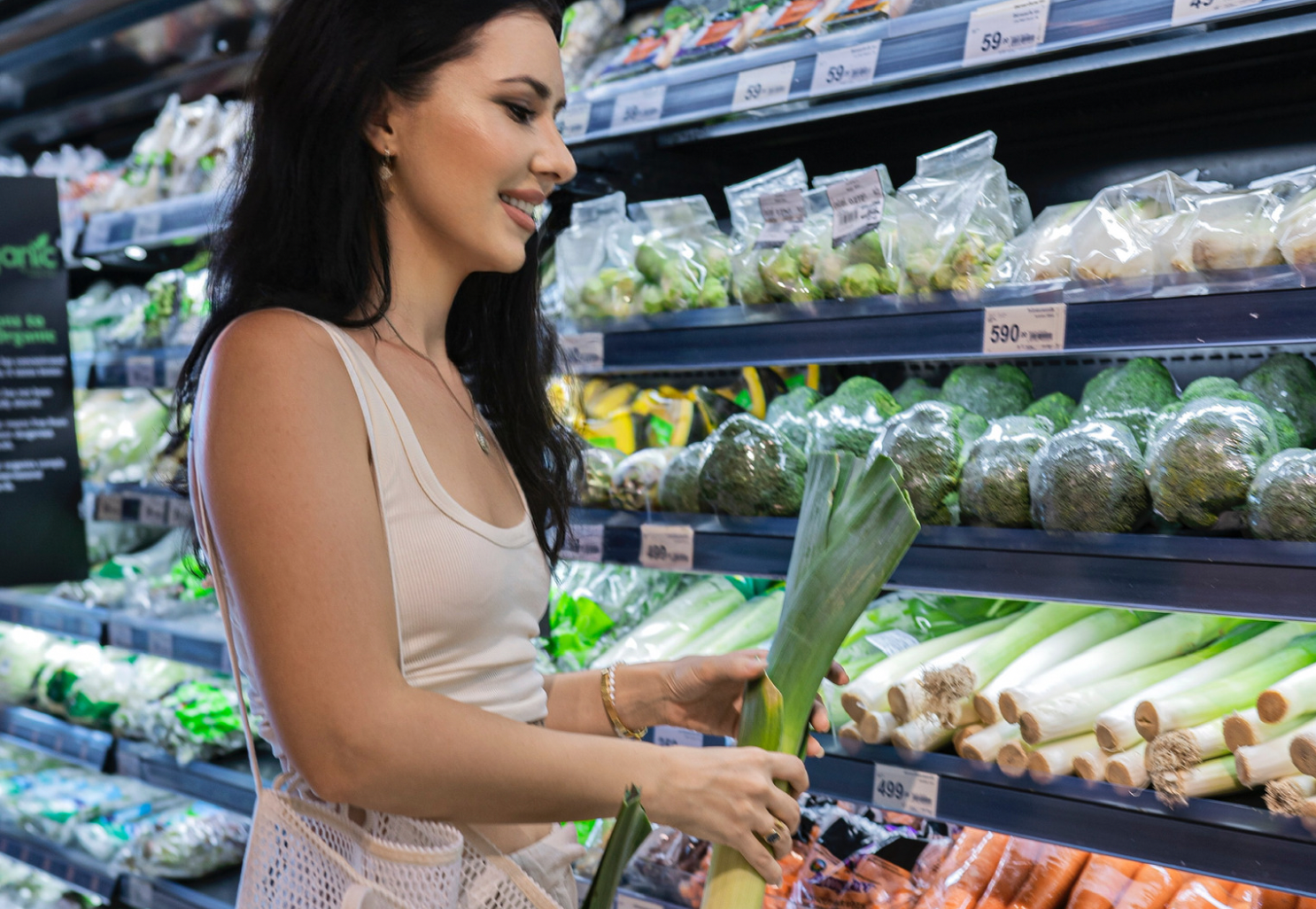Over the past few years, there has been a growing trend towards plant-based nutrition. More and more people are adopting this eating method to enhance their overall well-being and minimise their ecological footprint. Despite the increasing volume of research supporting the advantages of a plant-based diet, there are still several misunderstandings and untruths that surround this dietary choice.
First of all, are plant-based diets healthy? As a plant-based nutritionist, I can confidently say that they are. In fact, the Academy of Nutrition and Dietetics states that “properly planned vegetarian, including vegan, diets are healthy, nutritionally adequate and may provide health benefits in the prevention and treatment of certain diseases”. This viewpoint is also supported by various other health organisations, such as the British Dietetic Association, Dietitians of Canada, The Dietitians Association of Australia and many others.
So, let’s get into it!
The very first misconception about plant-based diets I want to cover is…
“Plant proteins are incomplete.”
I frequently come across this statement, and honestly, it drives me crazy.
There is a common misconception that most plants are an “incomplete” protein source due to them missing certain essential amino acids and that we must complement plant protein sources in a meal to make up for it. Similarly, some believe that quinoa or soy are the only “complete” proteins among plant foods. However, both of these statements are misleading and incorrect.
ALL PLANTS CONTAIN ALL AMINO ACIDS.
Essential amino acids make up the foundation of protein and are necessary to consume through our diets, as our bodies cannot produce them independently. Some people who are against plant-based diets often spread the misconception that plant proteins are incomplete. They claim that plants alone cannot provide enough protein to support muscle growth and overall health.
The truth is that all plant-based foods contain the essential amino acids required by the body. However, the amounts of these amino acids may vary among different plant-based foods. (See table below). For instance, some foods may have fewer specific amino acids like lysine, leucine, or methionine. However, consuming a diverse diet of whole plant-based foods will prevent any deficiencies in these essential amino acids that may arise.
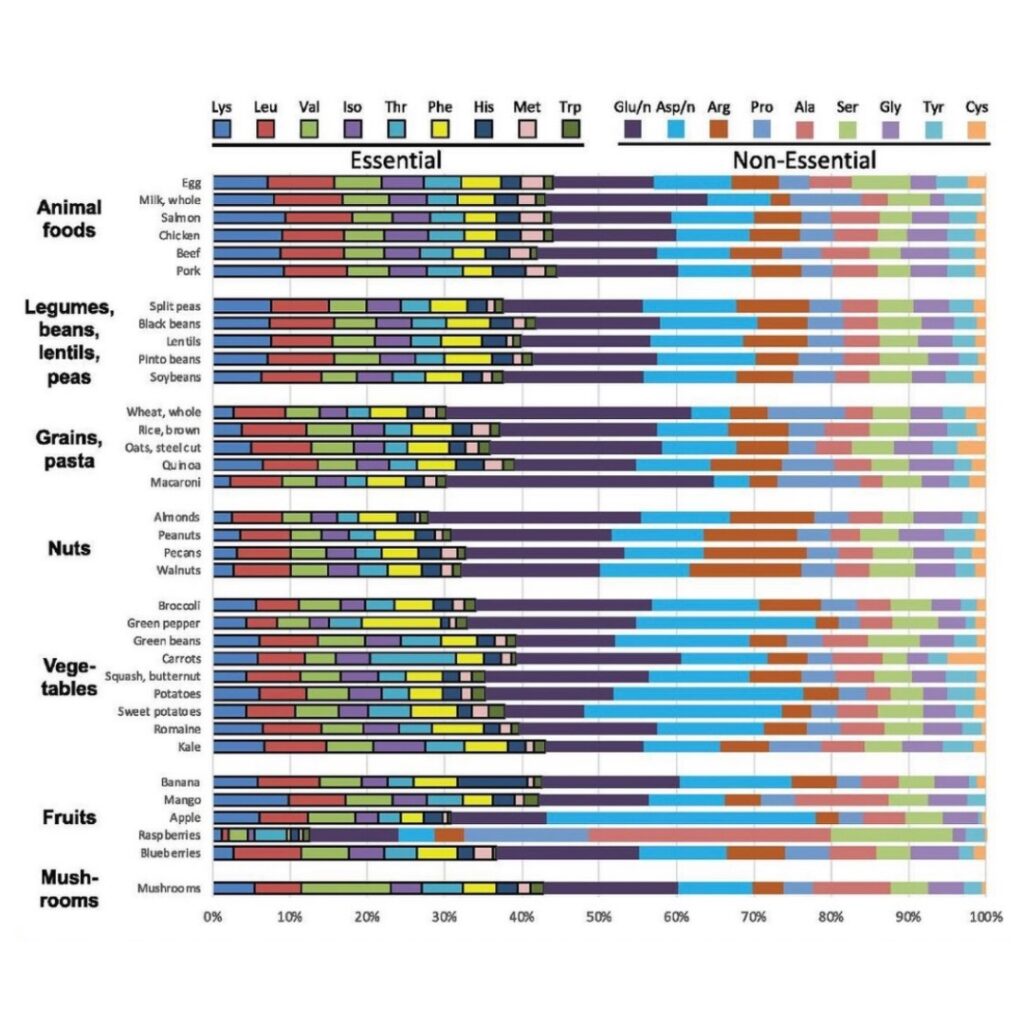
So, the right thing to say would be that different plants have different ratios of amino acids, but since we eat various foods, this is not an issue. It is also not a requirement to complement protein sources at every meal – our bodies pool essential amino acids to be used when necessary. As long as we don’t rely on one type of food for protein and meet our daily calorie needs, we can obtain all the amino acids we need.
The concept of dividing proteins into “complete” or “incomplete” categories is outdated and oversimplified. The body can combine amino acids from different sources each day to form a complete protein. Hence, while quinoa and soy are fantastic protein sources, they are not the only options for those following a plant-based diet. To ensure sufficient protein intake, it’s critical to consume various protein-rich plant foods such as legumes, nuts, seeds, and whole grains.
So, how much protein do we need?
Most people require approximately 1 gram of protein per kilogram of their body weight. However, high-level athletes may benefit from consuming 1.6 grams of protein per kilogram of their body weight. Those individuals who consume more protein usually require more calories. Therefore, they should focus on including plant-based foods with higher protein content in their diet, such as beans, lentils, tofu, tempeh and soy milk every day. Soy products are an excellent source of protein, with a score of 0.99 on the Protein-Digestibility-Corrected Amino Acid Score (PDCAAS), which is only slightly lower than casein and egg whites.
And this takes us to another popular myth: “Soy foods are bad!”
Soy foods have been a dietary staple in many cultures for centuries. However, there are still some myths and misconceptions surrounding their consumption. The misinformation often revolves around the idea that soy is dangerous due to its high phytoestrogen content, which makes people worry about its estrogenic effects.
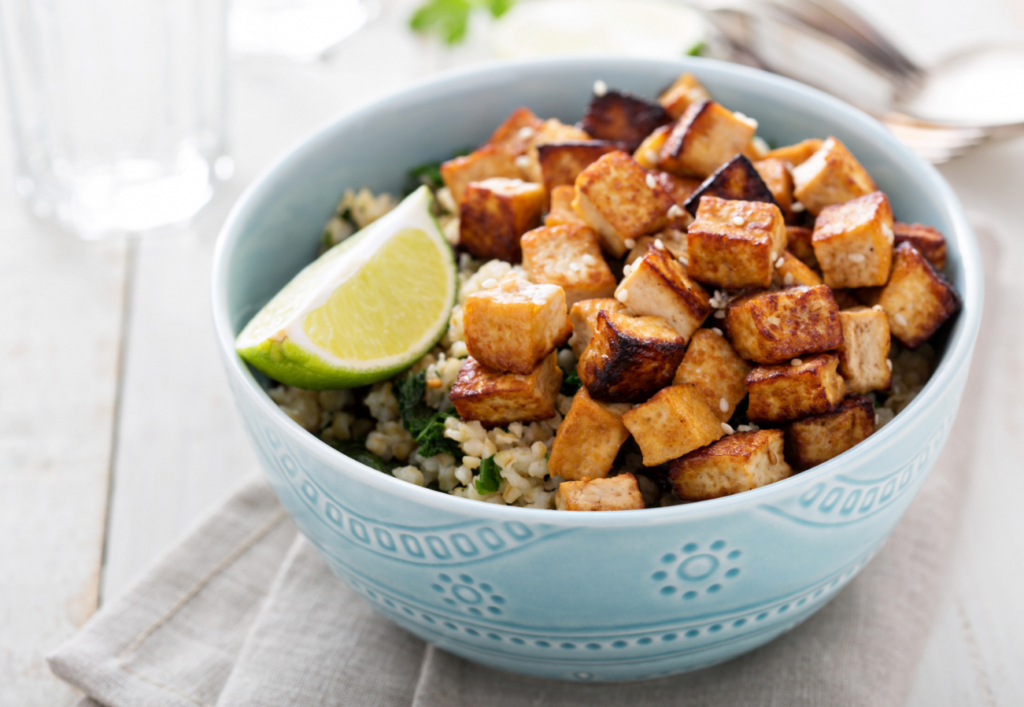
There is a common misconception that soy foods can increase the risk of breast cancer. However, this myth is based on studies conducted on rats, not humans. It has been discovered that rats metabolise soy differently than humans. Therefore, soy products should not be feared, and they may even be beneficial in preventing breast cancer in humans, especially when consumed during puberty.
Studies show that women who frequently consumed soy when they were younger had less than half the risk of breast cancer compared to those who didn’t. (PMID: 19318430) This is because the phytoestrogens present in soy have antiestrogenic effects in breast tissue and help regulate estrogen response in the body.
On the other hand, soy has been shown to reduce menopausal flushes in women, having a pro-estrogenic effect. (PMID: 34260478)
How is it possible?
Depending on the hormone status of the person, isoflavones, a group of phytoestrogens found primarily in soybeans, appear to mimic estrogen in some and block its effect in others.
Another myth is that soy foods disrupt hormone levels, especially in men. However, clinical studies have shown that isoflavones, the compounds found in soy, do not affect testosterone or circulating estrogen levels in men. Even when exposed to significantly higher levels of isoflavones than those found in a typical Asian male consuming a soy-rich diet, isoflavones have not been found to have feminising effects. (PMID: 33383165).
If you are concerned about consuming soy due to its potential impact on thyroid function, you’ll be glad that a review of 400 studies in 2021 found that isoflavones had no adverse effects on thyroid function. However, humans only experienced hypothyroidism when their soy-based diets were deficient in iodine. Although soy may slightly interfere with iodine uptake by the thyroid gland, this isn’t a concern if you consume enough iodine.
Soy can interfere with thyroid hormone medication, but this can be avoided by spacing out the time between medication and soy consumption. If you take thyroid medication, it’s always best to check with your doctor before changing your diet.

To wrap it up, soy doesn’t appear to affect our sex hormone levels significantly. Multiple meta-analyses have found no link between soy consumption and low testosterone or high estrogen levels in men. Similarly, a 2009 meta-analysis found no significant effect of soy on estrogen levels in women. (PMID: 19299447)
So, if you’re concerned about the hormone effects of your food, it’s worth limiting your dairy consumption. Dairy products contain mammalian estrogen, which has the same effect as estrogen in our bodies.
And what about GMO soy?
GMO soybeans are beans that have undergone genetic engineering for a specific purpose. Indeed, approximately 80% of the global soybean crop is genetically modified, but most of it is used to feed farm animals. So, by choosing meat instead of tofu, you are still indirectly consuming GMOs!
If avoiding GMOs is crucial for you, most of the soy products for human consumption are produced from non-GMO soybeans, and soy foods labelled non-GMO, such as tofu, tempeh, and soy milk, are widely available in stores.
Now let’s talk about the statement: “All processed food is bad!”
In today’s fast-paced world, processed foods often get a bad rap. While it’s true that some processed foods can be high in added sugars, unhealthy fats, and preservatives, not all fall into the unhealthy category. Surprisingly, there are processed foods that can offer convenience, affordability, and even essential nutrients.
To begin with, let’s define the meaning of “processed foods”. Processed foods are raw agricultural commodities that have undergone various procedures such as washing, cleaning, milling, cutting, heating, pasteurising, blanching, cooking, canning, freezing, drying, dehydrating, mixing, or packaging. These processes change the natural state of the raw food items.
So basically, any food that underwent a minor change in your kitchen would be considered “processed!” Shocking right? Of course, you can argue with me and say that Cheetos chips are a processed food and not healthy, and I would agree with you. However, it is important to use the correct terminology, as fast food or junk food would be considered “ultra-processed food”, and we all universally agree that they are not good for us.
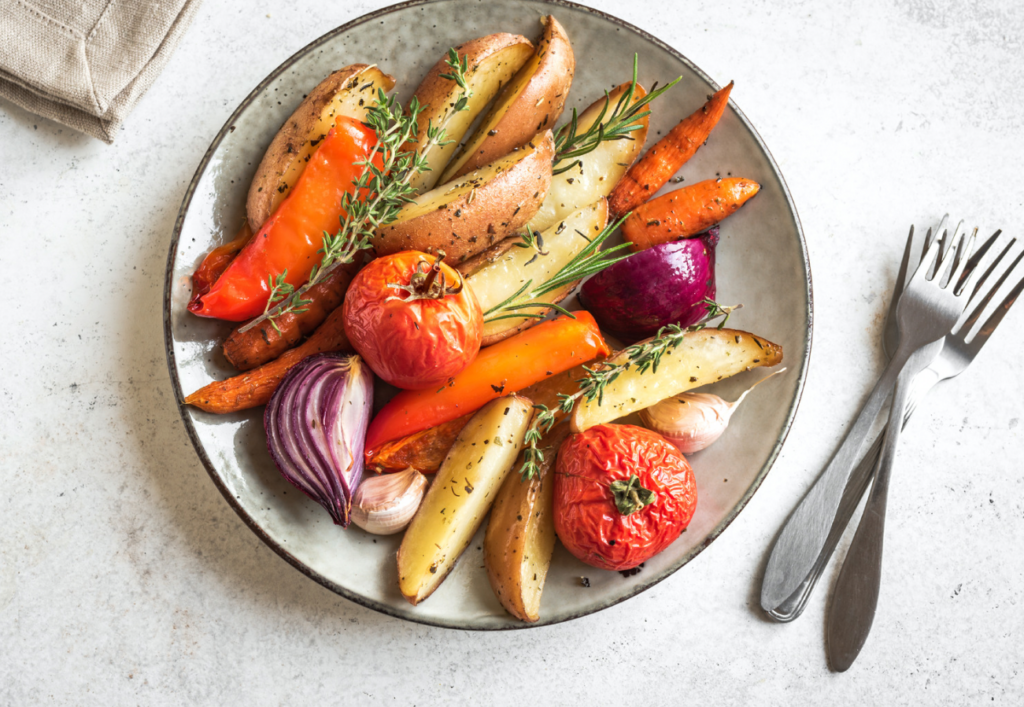
I find this myth annoying because many people hear the term ‘processed’ and assume that anything that doesn’t come in its natural form is terrible. This kind of thinking can make life harder and is often why people choose extreme diets, like consuming only raw foods. It can also lead to disordered eating habits and guilt when consuming anything “processed”.
An excellent example would be the comparison between dry and canned beans. Many people believe that canned beans are not a healthy food option because they are processed. However, canned beans are not necessarily a poor choice. If nutrition is your primary concern, dried beans are the way to go. They have a higher energy density, protein, fibre and some micronutrients when compared to canned beans.
But what if convenience is also a priority? Unlike dried beans, which require lengthy preparation, canned beans can be added directly to your recipes, saving valuable time in the kitchen. Although they are slightly less nutrient-dense, canned beans still are very nutritious. Therefore, why turn your back on such a reliable pantry staple?
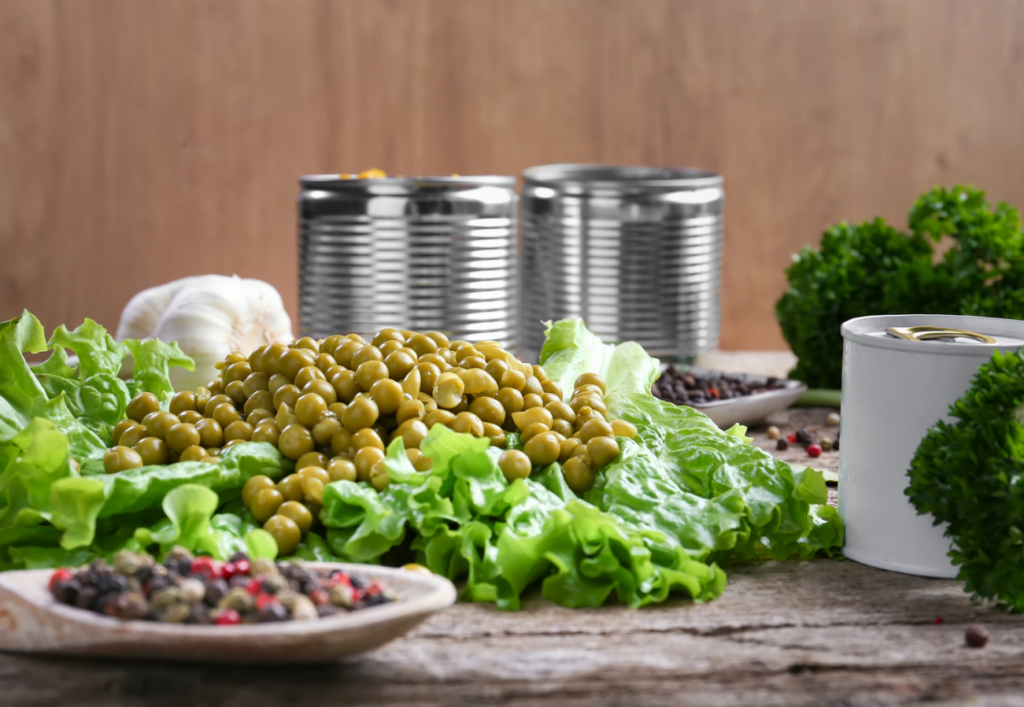
Of course, some downsides could be like high sodium levels or BPAs. Following simple guidelines can help to make better choices, like choosing BPA-free and organic and rinsing your beans well to get rid of sodium residues.
So the takeaway is: It’s worth noting that many of the food and drinks we consume undergo some level of processing for various reasons, such as enhancing their taste, extending their shelf life, adding essential vitamins and minerals, or minimising food waste. While some processing can be beneficial, it’s best to steer clear of ultra-processed foods as they may contain excessive amounts of sugar, fat, or sodium, which may not be healthy for the body. Instead, opt for minimally processed options that provide essential nutrients without compromising taste or quality.
Speaking of essential nutrients…
Myth four: “Plant-based diets are nutrient deficient.”
A diet primarily composed of vegetables, fruits, legumes, whole grains, nuts and seeds is considered highly nutrient-dense. These plant-based foods not only provide an excellent source of antioxidants and fibre but also supply healthy levels of protein to our bodies.
However, just like any other diet, plant-based diets must be well-thought-through to avoid deficiencies of some crucial nutrients mentioned below.
Most importantly, people who eat little or no meat should supplement with Vitamin B twelve.
Vitamin B12 is a vital nutrient that has multiple functions in our body. It helps in maintaining a healthy metabolism, protects nerve cells, promotes their growth, and is essential for the production of red blood cells. B12 is mainly obtained from the bacteria present in soil, but due to our hygienic lifestyles, these microorganisms can get destroyed, leading to a deficiency of this nutrient.
Animal products like meat, eggs and dairy are good sources of vitamin B12, as the supplement is added to the feeds given to factory-farmed animals. However, people following a vegan or vegetarian diet, as well as some meat-eaters, could be at risk of B12 deficiency. The deficiency can also occur due to reduced absorption of B12 with age, atrophic gastritis, conditions affecting the small intestine such as Crohn’s and coeliac disease, or certain medications like proton pump inhibitors and metformin.
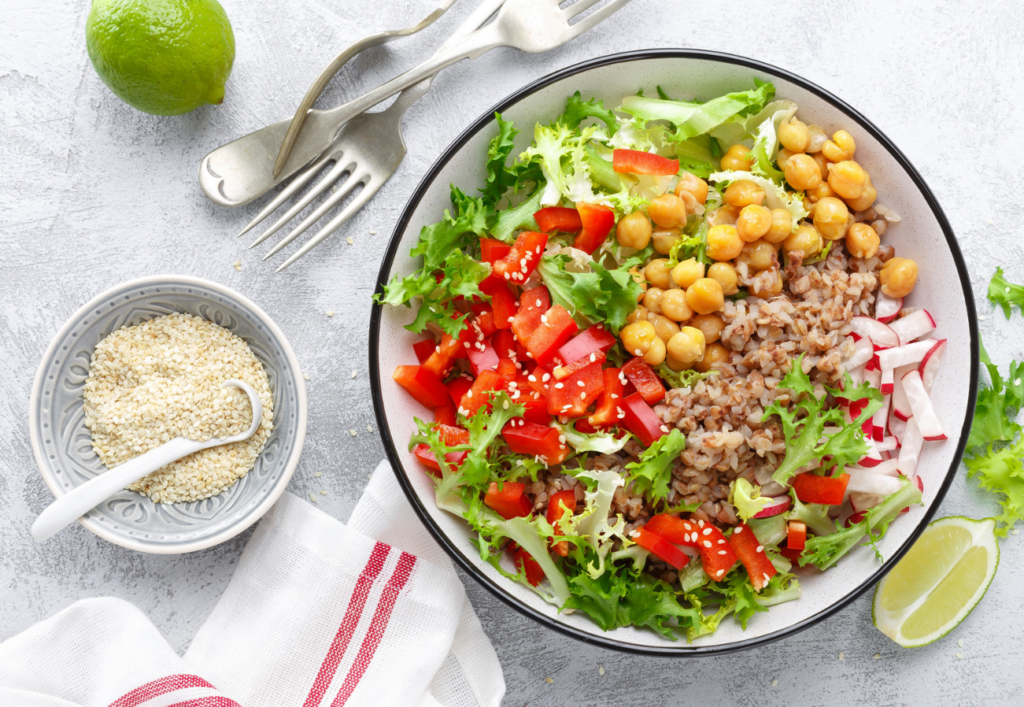
Another essential vitamin is Vitamin D, which is synthesised in the skin after sun exposure. However, if sun exposure is less than 5 to 15 minutes, then people with dark skin or in colder climates will need to use supplements or fortified foods (breakfast cereals, bread, plant-based milk). Getting enough Vitamin D is essential to help the body absorb Calcium from food. Vitamin D and Calcium work together to protect your bones, so if you have low Calcium, it makes sense to check your Vitamin D levels.
To avoid Calcium deficiencies, make sure to consume enough calcium-rich foods like soy foods, white beans, spinach, nettle, tahini, edamame, chickpeas, chia seeds, oranges, adzuki beans, broccoli, okra, snap beans, fig, sweet potato, parsley, carrot, pumpkin, cabbage, almonds, quinoa, tomato, arugula and Brazil nuts. Isn’t it a fantastic variety?
As you see, Calcium is not just found in dairy! It’s actually found in soils and is absorbed by plants through their roots. Cows don’t naturally contain Calcium. Instead, they get it from eating dark, leafy plants. And if you are worried about antinutrients in plants like oxalic acid, which binds with calcium and reduces absorption, remember that cooking, soaking, steaming, sprouting and fermenting, then draining can significantly reduce their content.
Adequate consumption of Iron should also be taken into consideration. It’s worth mentioning that iron deficiency can be present regardless of what diet you follow; it is most common in children, women of childbearing age and people who are suffering from diseases that affect the absorption of nutrients.
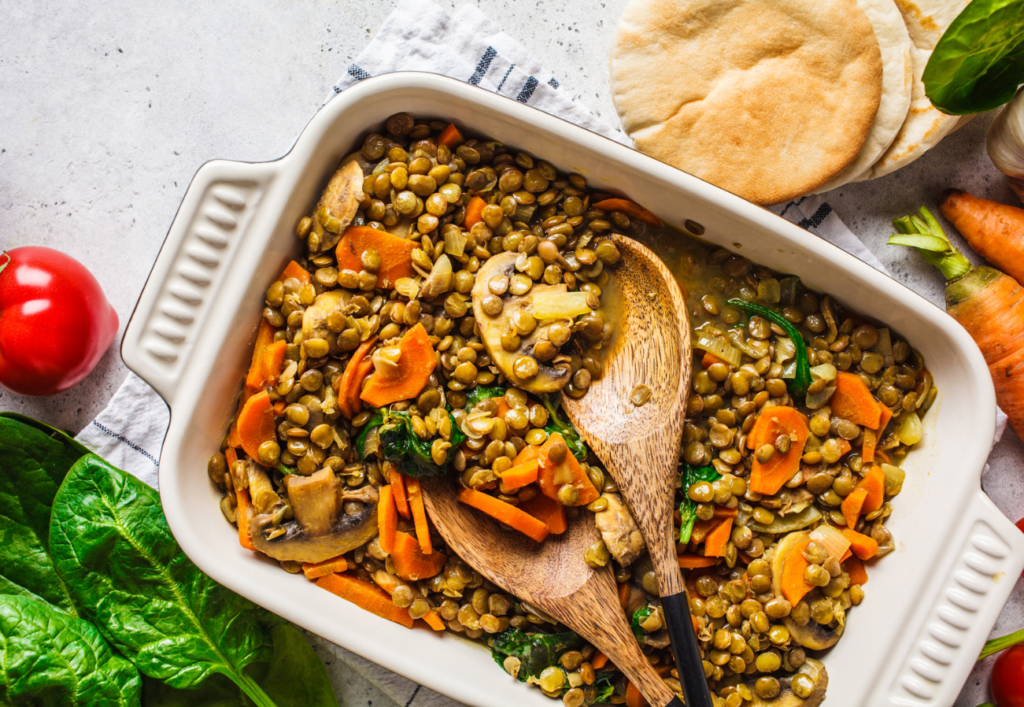
Iron is a vital mineral that our bodies require for various functions. It plays a significant role in haemoglobin in red blood cells and myoglobin in muscles, which helps transport oxygen throughout the body. Iron also plays a crucial role in some proteins and enzymes, and it contributes to maintaining a healthy immune system.
Iron is found in various foods, such as cooked lentils, spinach, pumpkin seeds, quinoa, broccoli, wholemeal bread, dried apricots, figs, tofu, tempeh, cabbage, kale, and dark chocolate. However, non-heme iron in these foods is not easily absorbed by the body, and its absorption can be affected by the presence of various nutrients like polyphenols, phytates, calcium, and specific proteins. To increase the absorption of iron-rich foods, it’s best to consume them paired with Vitamin C, garlic, and onions. It’s also crucial to avoid drinking caffeine during or straight after meals.
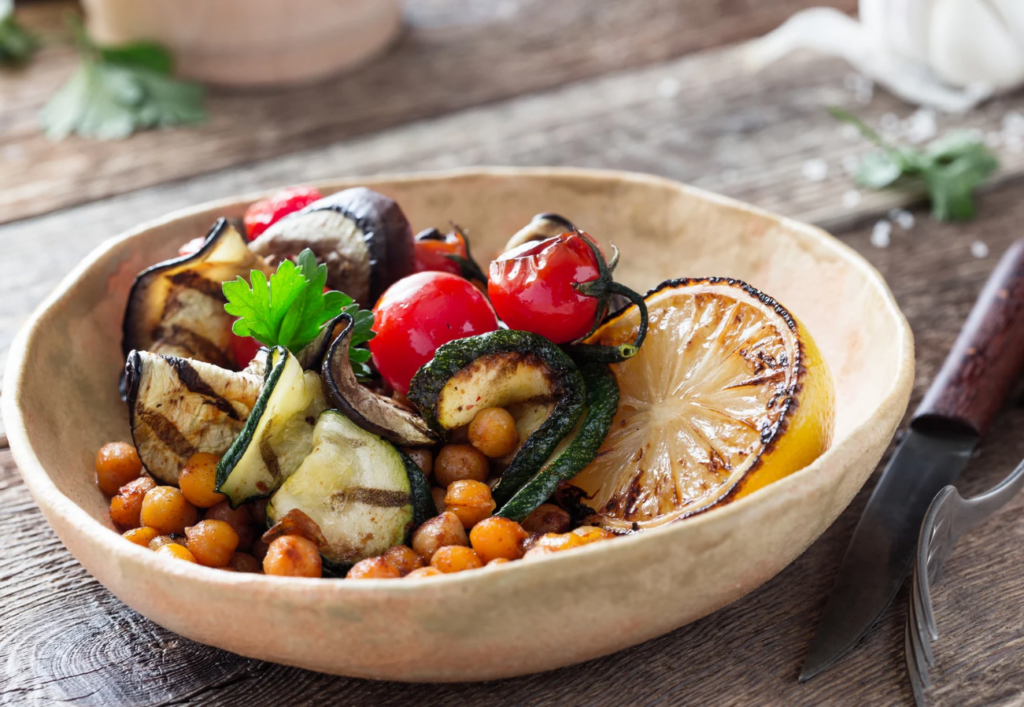
And remember that just because iron in animal foods is easily absorbed doesn’t necessarily mean it’s a better option. Excess iron can cause DNA damage and has been linked to the development of cardiovascular disease. Therefore, it’s crucial to maintain an adequate iron balance in the body, which, with a bit of planning, can easily be achieved on a plant-based diet.
Following a mindful approach, plant-based diets can be a nourishing and sustainable choice. It is essential to focus on consuming a variety of plant foods to ensure you are getting all the necessary nutrients. This includes whole grains, fruits, vegetables, legumes, nuts, and seeds. To avoid deficiencies, it is recommended to supplement with vitamin B12, as it is primarily found in animal products. Additionally, incorporating fortified foods such as plant-based milk and breakfast cereals can also help meet B12 needs. With proper planning, a plant-based diet can be a delicious and nutritious way to support your health and the environment.
And the last myth is “Plant-based means vegan.”
While a plant-based diet may often be associated with veganism, there is a distinction between the two. A plant-based diet typically focuses on consuming whole, minimally processed plant foods such as fruits, vegetables, whole grains, nuts, and seeds, with limited or no animal products. On the other hand, veganism is a lifestyle that seeks to exclude all forms of exploitation and cruelty to animals, including in diet, clothing, and other areas. While all vegans follow a plant-based diet, not all individuals following a plant-based diet identify as vegan. It’s important to understand and respect the nuances between the two dietary choices.
Saying that, If you are already a vegan, it is worth paying attention to the quality of your diet. Shifting from processed vegan foods to minimally processed ones will not only nurture your ethics but also add years to your life. On the other hand, if you are not vegan but want to adopt a plant-based diet for health reasons, it does not mean that you have to eliminate all animal foods from your meals. Adding small amounts of dairy, eggs, and fish can help you stick to a healthy plant-forward diet and avoid relapsing into old habits.
If you are interested to learn more about plant-based diets, check out my other article and make sure to follow me on Instagram!
